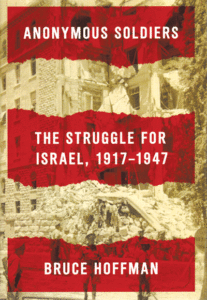Anonymous Soldiers: The Struggle for Israel, 1917-1947, by Bruce Hoffman, Knopf, 618 pages, $35
Reviewed by NEAL GENDLER
After reading Bruce Hoffman’s history of how Jewish terrorism drove Britain from its Palestine Mandate, it’s interesting to consider whether freer Jewish immigration might have prevented or lessened the violence.
Perhaps, however, violence would have come instead from the Arabs, whose 1936 revolt had led Britain to further restrict Jewish immigration just as it was needed most desperately.
Britain, ever fearful of Arab reaction, kept the restrictions after the war, even refusing President Harry Truman’s demands it admit 100,000 Shoah survivors enduring deplorable conditions in European displaced persons’ camps.

So if Britain wouldn’t let Jews in, Jews had to get Britain out. While the official Zionist structure emphasized diplomacy, a Jewish underground made the mandate ungovernable and, for economically exhausted Britain, unaffordable.
“The Jewish terrorist campaign was arguably the first post-World War II ‘war of national liberation’ to clearly recognize the publicity value inherent in terrorism,” says Hoffman in the 484 pages of his extensively researched Anonymous Soldiers. “The violence was often choreographed for an audience far beyond the… locus of the terrorists’ struggle.”
For three postwar years, the British public grew increasingly anti-Jewish as it read about humiliating raids on its government installations and deaths of its soldiers and police.
Eventually, Britain had 100,000 troops in Palestine — 10 percent of its remaining armed forces. Even so, Hoffman says, it could not “effectively counter the threat presented by two small terrorist organizations.”
Hoffman’s easily read account — related mostly through Britain’s futile efforts to assert control while lacking a policy for doing so — begins with the defeat of the Turks in World War I and the relatively peaceful 1920s. The Arab anti-Jewish riots of 1929, with their “unprecedented violence, [were] a turning point in the history of both British rule, and Arab and Jewish relations,” says Hoffman, director of the Center for Security Studies and of the Security Studies program at Georgetown University.
Then the land was relatively quiet, prospering until the Arab revolt of 1936. Even after that was put down, Arab and Jewish terrorism continued; 5,708 incidents were recorded in 1938.
Hoffman describes the Jewish fighting organizations: mainstream Hagana; an aggressive offshoot that became the Irgun Zvai Leumi; and a more violent Irgun split-off known by the Hebrew acronym Lehi.
Lehi numbered a few hundred, but Irgun grew to an estimated 5,000, an underground army led after 1942 by Menachem Begin with mandate-period principles that included attacking only the British and seeking to avoid causing casualties.
Lehi, “the Stern Gang,” to the British — after leader Abraham Stern — dealt in assassinations, one of them the first of three events Hoffman suggests had the greatest consequences.
In November 1944, Lehi gunmen killed Lord Moyne, Britain’s Cairo-based minister of state in the Middle East. Moyne’s anti-Jewish sentiments had been changing, said his close friend, Prime Minister Winston Churchill. Churchill, long pro-Zionist, had been talking favorably about the Jews’ future in a partitioned Palestine.
Moyne’s assassination swept “what was likely to be an immediate and favorable decision on the mandate’s future” from both cabinet and Churchill’s agendas, Hoffman says.
Second was Irgun’s bombing of British headquarters in Jerusalem’s King David Hotel in 1946. Despite a telephoned warning — Hoffman names the woman who telephoned it — 91 people died. Ben-Gurion claimed the bombing was done without his knowledge; Begin said otherwise. Hoffman says it was included in a three-part action approved, then canceled by Hagana without telling Irgun.
Third was Irgun’s 1947 hanging of two British sergeants. After Britain condemned three Irgun members to death, Irgun kidnapped the sergeants and held them for days, demanding the death sentences be commuted. The Jews were hung. Irgun then hung the sergeants. In enraged Britain, demands to quit the mandate intensified.
Eventually, Britain gave up and threw the problem to the United Nations, which voted for partition in November 1947.
In his introduction, Hoffman asks: “Does terrorism work? Its targets and victims maintain that it does not… yet if terrorism is so ineffective, why has it persisted?” We can ponder that while removing our shoes at the airport.
***
Neal Gendler is a Minneapolis writer and editor.
(American Jewish World, 3.13.15)



















